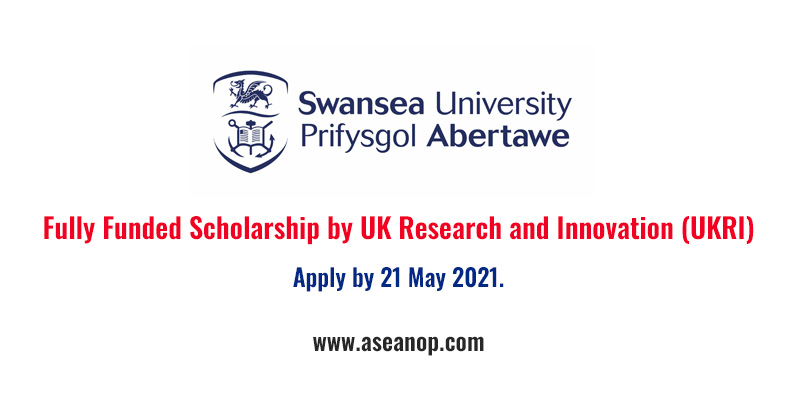Swansea University Fully Funded Scholarship by UK Research and Innovation (UKRI)

This scholarship is funded by UK Research and Innovation (UKRI).
Start date: October 2021
The UK Research and Innovation (UKRI) Centre for Doctoral Training (CDT) in Artificial Intelligence, Machine Learning and Advanced Computing (AIMLAC) aims at forming the next generation of AI innovators across a broad range of STEMM disciplines. The CDT provides advanced multi-disciplinary training in an inclusive, caring and open environment that nurture each individual student to achieve their full potential. Applications are encouraged from candidates from a diverse background that can positively contribute to the future of our society.
Our doctoral training programme is constructed around three research themes:
- T1: data from large science facilities (particle physics, astronomy, cosmology)
- T2: biological, health and clinical sciences (medical imaging, electronic health records, bioinformatics)
- T3: novel mathematical, physical, and computer science approaches (data, hardware, software, algorithms)
Supervisors:
- First supervisor: Professor R. S. Conlan (Medical School)
- Second supervisor: Professor Paul Rees (Engineering)
- Third supervisor: Professor D. Gonzalez (Medical School)
- Fourth supervisor: Dr L.W. Francis (Medical School)
Department/Institution: Medical School, College of Engineering and Swansea Bay UHB
Research theme:
- T2: biological, health and clinical sciences
- T3: novel mathematical, physical and computer science approaches
Project description:
This project will advance the fundamental understanding of the functional genomics status and dynamic responses in cancer environments, with project opportunities including single cell and spatial functional genomes including transcriptome and epigenome analysis.
Project examples include:
- Exploring the spatial epigenomics of a 3D cellular models to understand the impact of pharmacological interventions on histone methylation (e.g. H3K4Me3, H3K9me2, H3K27me3). Epigenome profiling in response to interventions will be assessed at the cellular level using the Microscopic Imaging of Epigenetic Landscapes technique involving high content multi-parameter data acquisition and analysis to reconstruct high-resolution spatial epigenome models.
- Single cell and spatial analysis of cancer functional genomes obtained using 10X Genomics platforms to generate data from immune cell complements (ATAC and RNA seq) or spatial analysis of tumour biopsies (10 X Visium, RNA seq) from gynaecological cancer patients.
Cell painting and/or data mining approaches developed in Swansea will be applied to overcome challenges for high content analysis including feature extraction and data analysis, and interpretation requiring the use of AI technologies (using Swansea’s new ATOS supercomputing capability). The successful applicant will develop and implement AI based strategies for the high-content data generated from cellular models of tumour microenvironments/cancer patient samples using advanced and computationally expensive algorithms.
The successful applicant will join the Reproductive Biology and Gynaecology Oncology research group in Swansea’s Medical School in collaboration with Professor Paul Rees in Swansea’s College of Engineering.
The successful applicant will be involved in data acquisition and analysis, and should have a degree in molecular biology or computer science or similar.
Eligibility
The typical academic requirement is a minimum of a 2:1 undergraduate degree in biological and health sciences; mathematics and computer science; physics and astronomy or a relevant discipline.
Candidates should be interested in AI and big data challenges, and in (at least) one of the three research themes. You should have an aptitude and ability in computational thinking and methods (as evidenced by a degree in physics and astronomy, medical science, computer science, or mathematics, for instance) including the ability to write software (or willingness to learn it).
This scholarship is open to UK and international candidates (including EU and EEA).
For more information on eligibility, please visit the UKRI CDT in Artificial Intelligence, Machine Learning & Advanced Computing website.
NB: If you are holding a non-UK degree, please see Swansea University degree comparisons to find out if you meet the eligibility.
If you have any questions regarding your academic eligibility based on the above comparison, please email pgrscholarships@swansea.ac.uk with the web-link to the scholarship(s) you are interested in.
Funding
This scholarship covers the full cost of tuition fees and an annual UKRI standard stipend £15,609.
Additional funding is available for training, research and conference expenses.
How to Apply
To apply, please visit the CDT website and follow the instructions to apply online.
For general enquiries, please contact contact Rhian Melita Morris (cdt-aimlac@swansea.ac.uk).
Deadline for applications is 21 May 2021.

Are you giving out a fully funded scholarship?
Good day
Do you offer full scholarship for MBA? What is your selection criteria?